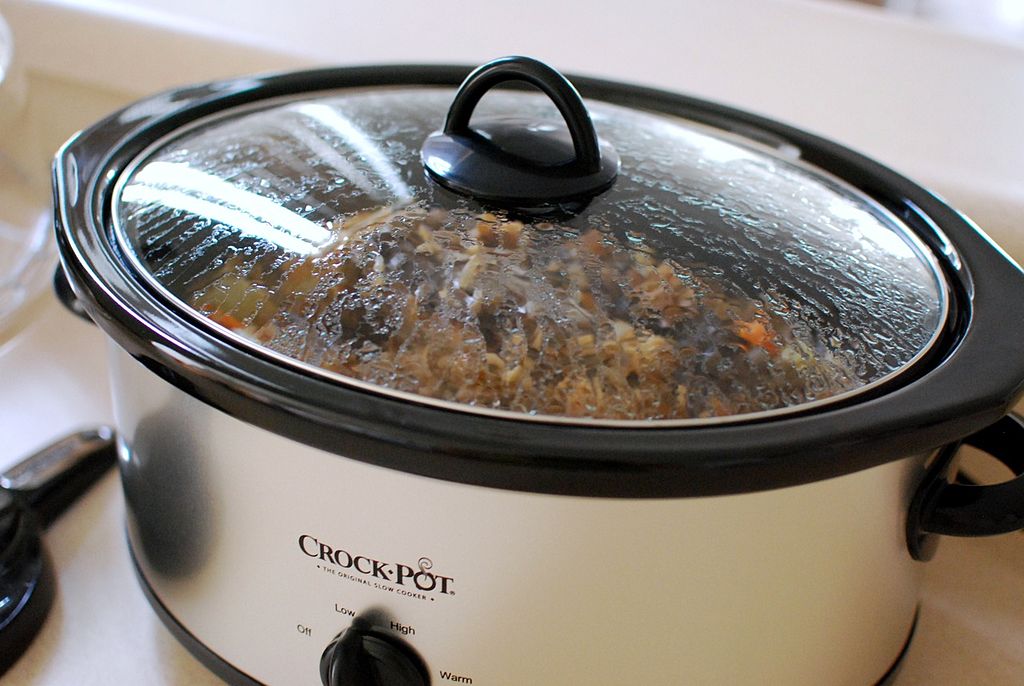A slow cooker (or a crockpot) is an electrical cooking appliance that uses low-temperature cooking. Low-temperature cooking is a process of simmering food that you can leave unattended for hours. Aside from the nature of the cooking method appropriate for slow cookers, the materials used in making slow cookers could be harmful to your health.
Cooking on a slow cooker can be toxic for two reasons: (1) some food must be cooked at the desired temperature to be nontoxic; and (2) lead, cadmium, and other heavy metals found in slow cookers can have adverse effects on the body.
Are Slow Cookers Bad for Your Health?
Slow cooking is a good cooking method. It can soften proteins that it can melt inside the mouth. However, it could possess some unwanted risks. Slow cookers can be bad for your health depending on the actual appliance and the food cooked on the appliance. Identifying if your slow cooker is harmful could prevent unwanted health-related circumstances.
Toxic materials found in slow cookers
Crockpots are composed of toxic heavy metals that could interfere with the human body’s normal functions when mixed in food preparation. The main toxins found inside a crockpot are lead, cadmium, aluminum, mercury, and arsenic. These materials can hide in paints, glaze coating, nonstick coatings, and plastic pieces used to manufacture slow cookers.
Lead is one of the early materials mixed on food and health production. It was removed as a material in the food industry after it releases multiple health risks. Some manufacturers are still considering mixing lead in the glaze coating, a special coating that can be found on cookware. As a neurotoxic metal, lead can produce complications in the blood and kidneys.
Cadmium is another toxic material mixed in the glaze coating. Slow cooking prolongs the food contact into the cooking equipment, making it more exposed to food. There is a high possibility of having a high cadmium-level on food than smoking. Prolonged exposures in cadmium may produce full-blown kidney damage, bone fractures, and lung-related diseases.
Aluminum may be a known product used in cooking (like foils and pans), but it can be hazardous if used inside a slow cooker. Slow cooking breaks down the aluminum into pieces, mixing it inside the food. High aluminum levels can cause anemia and other health issues in the bones, brain, and nervous system.
Mercury, which can also be found on poorly prepared seafood, can be harmful to children, pregnant women, and nursing mothers. Mercury can affect a child’s early development. If consumed in uncontrollable amounts, it can create mercury poisoning. It can cause severe headaches, numbness, and memory problems.
Arsenic can be found in the water used during slow cooking food. Ingestion of arsenic can be only lethal if taken on a large amount. Arsenicosis or arsenic poising can cause serious health complications like cancer, liver disease, coma, and death if not treated accordingly.
To prevent this, check your slow cooker’s FDA status. If the material is toxins-free, the next thing to discover the food’s required temperatures. Dried kidney beans contain a natural toxin that can be destroyed by boiling it for 10 minutes. If placed inside the slow cooker without boiling, phytohaemagglutinin found in kidney beans will retain—that can cause vomiting and even death.
Do Slow Cookers Leach Lead?
Despite it possess life-threatening effects, manufacturers are still using lead in making slow cookers. According to Food Drug Association, lead can be used in food equipment production—if used in an “acceptable amount.” However, the same association releases contradicting standards in all-time, making a lead-filled slow cooker unsafe for food preparation.
Lead can be found naturally or mixed with other harmful toxins to provide additional coating and protection to prolong the slow cooker’s expectancy. Yet, prolonged usage of slow cookers may dent, crack, or bend the product, leaching the lead out quickly.
Manufacturers may insist that lead-type slow cookers are deemed “safe” as long as there is no chipping, crazing, or cracking of the glaze. However, there are still micro-fissures that may not be visible to the naked eye—yet they can still mix the leaching lead.
As a toxin, lead is a cheap alternative to other food-safe products. If taken in large amounts, it can gradually build up inside the body’s system, giving enough time for the lead to harm the body. Lead toxicity can produce diseases in the reproduction, immune, cardiovascular, and nervous systems.
Several factors in the equation can cause the slow cooker to leach lead. While the temperature is already a given factor, cooking duration and food’s acidity can also impact lead leaching. If cooking for more than three hours, the lead found in some slow cookers will begin leaking until it mixed it food. The procedure will fasten if acidic foods like vinegar, tomatoes, and citric foods are introduced inside the slow cooker.
Slow Cooker Food Safety Reminders
In general, a slow cooker can still be used for cooking. Despite its alarming health hazards, you may still cook your food by following these food safety reminders:
- Check for the FDA’s guidelines. Manufacturers provide different recipes and safety standards and must be followed accordingly.
- Thaw meat and poultry before placing them inside the slow cooker. Before placing frozen food, it should be cooked at boiling temperatures to remove foodborne diseases.
- Preheat the slow cooker before adding preheated food. Adding boiling liquid may rapidly increase the temperature needed for cooking.
- Constantly use the food thermometer to check the food’s internal temperature. It should reach 140°F to 165°F to destroy bacteria.
- Do not reheat your food inside a slow cooker. This will make the food prone to bacteria thriving on low temperatures that can cause food poisoning.
Picture from Janine from Mililani, Hawaii, United States, CC BY 2.0, via Wikimedia Commons

